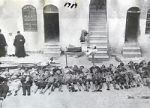Robert Heinlein's "The Long Watch" - Full Text (metallicman.com)
Take a look around the website (Doz are these guys some you ever ran into?)
Heinlein's "The Long Watch" full text
Robert Heinlein’s “The Long Watch” – Full Text

 There are often things that inspire us. This is most especially true when you are young and looking for direction. In my case, I was greatly influenced by the books that I read. My favorites were short-length science fiction “pulps”. These were often paperback books that I could shove in the rear pocket of my bluejeans. I would read them, and often reread them. The authors of these stories varied, but my favorites included Ray Bradbury and Robert Heinlein.
There are often things that inspire us. This is most especially true when you are young and looking for direction. In my case, I was greatly influenced by the books that I read. My favorites were short-length science fiction “pulps”. These were often paperback books that I could shove in the rear pocket of my bluejeans. I would read them, and often reread them. The authors of these stories varied, but my favorites included Ray Bradbury and Robert Heinlein.
Here is one such story.
This story illustrates that sometimes, it take one person to take a necessary action. Often that person doesn’t want the role. However, there is no one else who can do it. So that person, out of necessity, must become the hero. He must do the difficult and uncomfortable job because he is the only one who is available.
This story holds special meaning to me.
Introduction
This story was written appeared in the December 1949 American Legion Magazine by Robert Heinlein, and presented here under Article 22 of China’s Copyright Law.
“The Long Watch” is a science fiction short story by American writer Robert A. Heinlein. It is about a military officer who faces a coup d’état by a would-be dictator.
John McClane: Do you know what you get for being a hero? Nothin'. You get shot at. Pat on the back, blah blah blah. 'Attaboy.' You get divorced... Your wife can't remember your last name, kids don't want to talk to you... You get to eat a lot of meals by yourself. Trust me kid, nobody wants to be that guy. (I do this) because there is nobody else to do it right now. Believe me if there was somebody else to do it, I would let them do it. There's not, so (I'm) doing it. That's what makes you that guy."
Enjoy.
The Long Watch
Nine ships blasted off from Moon Base. Once in space, eight of them formed a globe around the smallest. They held this formation all the way to Earth.
"The small ship displayed the insignia of an admiral-yet there was no living thing of any sort in her. She was not even a passenger ship, but a drone, a robot ship intended for radioactive cargo. This trip she carried nothing but a lead coffin and a Geiger counter that was never quiet."
—from the editorial After
Ten Years, film 38,
17 June 2009, Archives of the
N. Y. Times
I
JOHNNY DAHLQUIST blew smoke at the Geiger counter. He grinned wryly and tried it again. His whole body was radioactive by now. Even his breath, the smoke from his cigarette, could make the Geiger counter scream.
How long had he been here? Time doesn’t mean much on the Moon. Two days? Three? A week? He let his mind run back: the last clearly marked time in his mind was when the Executive Officer had sent for him, right after breakfast—
“Lieutenant Dahlquist, reporting to the Executive Officer.”
Colonel Towers looked up. “Ah, John Ezra. Sit down, Johnny. Cigarette?”
Johnny sat down, mystified but flattered. He admired Colonel Towers, for his brilliance, his ability to dominate, and for his battle record. Johnny had no battle record; he had been commissioned on completing his doctor’s degree in nuclear physics and was now junior bomb officer of Moon Base.
The Colonel wanted to talk politics; Johnny was
puzzled.
Finally Towers had come to the point; it was not safe (so he said) to leave control of the world in political hands; power must be held by a scientifically selected group. In short—the Patrol.
Johnny was startled rather than shocked. As an abstract idea, Towers’ notion sounded plausible. The League of Nations had folded up; what would keep the United Nations from breaking up, too, and thus lead to another World War. “And you know how bad such a war would be, Johnny.”
Johnny agreed. Towers said he was glad that Johnny got the point. The senior bomb officer could handle the work, but it was better to have both specialists.
Johnny sat up with a jerk. “You are going to
do something about it?” He had thought the Exec was just talking.
Towers smiled. “We’re not politicians; we don’t just talk. We act.”
Johnny whistled. “When does this start?”
Towers flipped a switch. Johnny was startled to hear his own voice, then identified the recorded conversation as having taken place in the junior officers’ messroom. A political argument he remembered, which he had walked out on . . . a good thing, too! But being spied on annoyed him.
Towers switched it off. “We
have acted,” he said. “We know who is safe and who isn’t. Take Kelly—” He waved at the loud-speaker. “Kelly is politically unreliable. You noticed he wasn’t at breakfast?”
“Huh? I thought he was on watch.”
“Kelly’s watch-standing days are over. Oh, relax; he isn’t hurt.”
Johnny thought this over. “Which list am I on?” he asked. “Safe or unsafe?”
“Your name has a question mark after it. But I have said all along that you could be depended on.” He grinned engagingly. “You won’t make a liar of me, Johnny?”
Dahlquist didn’t answer; Towers said sharply, “Come now—what do you think of it? Speak up.”
“Well, if you ask me, you’ve bitten off more than you can chew. While it’s true that Moon Base controls the Earth, Moon Base itself is a sitting duck for a ship. One bomb—
blooie!”
Towers picked up a message form and handed it over; it read: I HAVE YOUR CLEAN LAUNDRY—ZACK. “That means every bomb in the
Trygve Lie has been put out of commission. I have reports from every ship we need worry about.” He stood up. “Think it over and see me after lunch. Major Morgan needs your help right away to change control frequencies on the bombs.”
“The control frequencies?”
“Naturally. We don’t want the bombs jammed before they reach their targets.”
“What? You said the idea was to
prevent war.”
Towers brushed it aside. “There won’t be a war—just a psy-chological demonstration, an unimportant town or two. A little bloodletting to save an all-out war. Simple arithmetic.”
He put a hand on Johnny’s shoulder. “You aren’t squeamish, or you wouldn’t be a bomb officer. Think of it as a surgical operation. And think of your family.”
Johnny Dahlquist had been thinking of his family. “Please, sir, I want to see the Commanding Officer.”
Towers frowned. “The Commodore is not available. As you know, I speak for him. See me again—after lunch.”
The Commodore was decidedly not available; the Commodore was dead. But Johnny did not know that.
* * *
Dahlquist walked back to the messroom, bought cigarettes, sat down and had a smoke. He got up, crushed out the butt, and headed for the Base’s west airlock. There he got into his space suit and went to the lockmaster. “Open her up, Smitty.”
The marine looked surprised. “Can’t let anyone out on the surface without word from Colonel Towers, sir. Hadn’t you heard?”
“Oh, yes! Give me your order book.” Dahlquist took it, wrote a pass for himself, and signed it “by direction of Colonel Towers.” He added, “Better call the Executive Officer and check it.”
The lockmaster read it and stuck the book in his pocket. “Oh, no, Lieutenant. Your word’s good.”
“Hate to disturb the Executive Officer, eh? Don’t blame you.” He stepped in, closed the inner door, and waited for the air to be sucked out.
Out on the Moon’s surface he blinked at the light and hurried to the track-rocket terminus; a car was waiting. He squeezed in, pulled down the hood, and punched the starting button. The rocket car flung itself at the hills, dived through and came out on a plain studded with projectile rockets, like candles on a cake. Quickly it dived into a second tunnel through more hills. There was a stomach-wrenching deceleration and the car stopped at the underground atom-bomb armory.
As Dahlquist climbed out he switched on his walkie-talkie. The space-suited guard at the entrance came to port-arms. Dahlquist said, “Morning, Lopez,” and walked by him to the airlock. He pulled it open.
The guard motioned him back. “Hey! Nobody goes in without the Executive Officer’s say-so.” He shifted his gun, fumbled in his pouch and got out a paper. “Read it, Lieutenant.”
Dahlquist waved it away. “I drafted that order myself.
You read it; you’ve misinterpreted it.”
“I don’t see how, Lieutenant.”
Dahlquist snatched the paper, glanced at it, then pointed to a line. “See? ‘—except persons specifically designated by the Executive Officer.’ That’s the bomb officers, Major Morgan and me.”
The guard looked worried. Dahlquist said, “Damn it, look up ‘specifically designated’—it’s under
‘Bomb Room, Security, Procedure for,’ in your standing orders. Don’t tell me you left them in the barracks!”
“Oh, no, sir! I’ve got ’em.” The guard reached into his pouch. Dahlquist gave him. back the sheet; the guard took it, hesitated, then leaned his weapon against his hip, shifted the paper to his left hand, and dug into his pouch with his right.
Dahlquist grabbed the gun, shoved it between the guard’s legs, and jerked. He threw the weapon away and ducked into the airlock. As he slammed the door he saw the guard struggling to his feet and reaching for his side arm. He dogged the outer door shut and felt a tingle in his fingers as a slug struck the door.
He flung himself at the inner door, jerked the spill lever, rushed back to the outer door and hung his weight on the handle. At once he could feel it stir. The guard was lifting up; the lieutenant was pulling down, with only his low Moon weight to anchor him. Slowly the handle raised before his eyes.
Air from the bomb room rushed into the lock through the spill valve. Dahlquist felt his space suit settle on his body as the pressure in the lock began to equal the pressure in the suit. He quit straining and let the guard raise the handle. It did not matter; thirteen tons of air pressure now held the door closed.
He latched open the inner door to the bomb room, so that it could not swing shut. As long as it was open, the airlock could not operate; no one could enter.




























